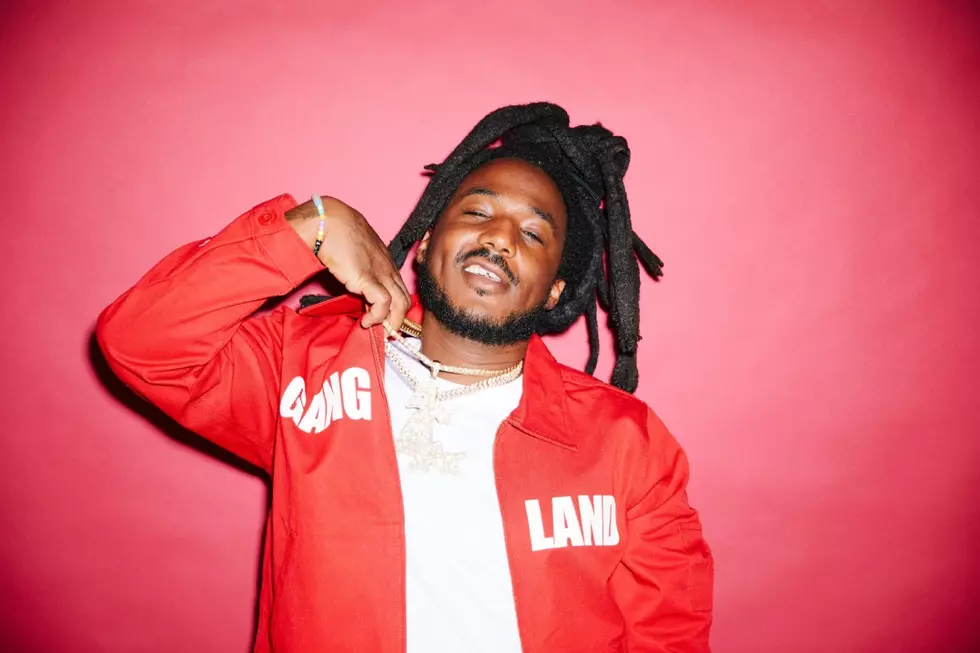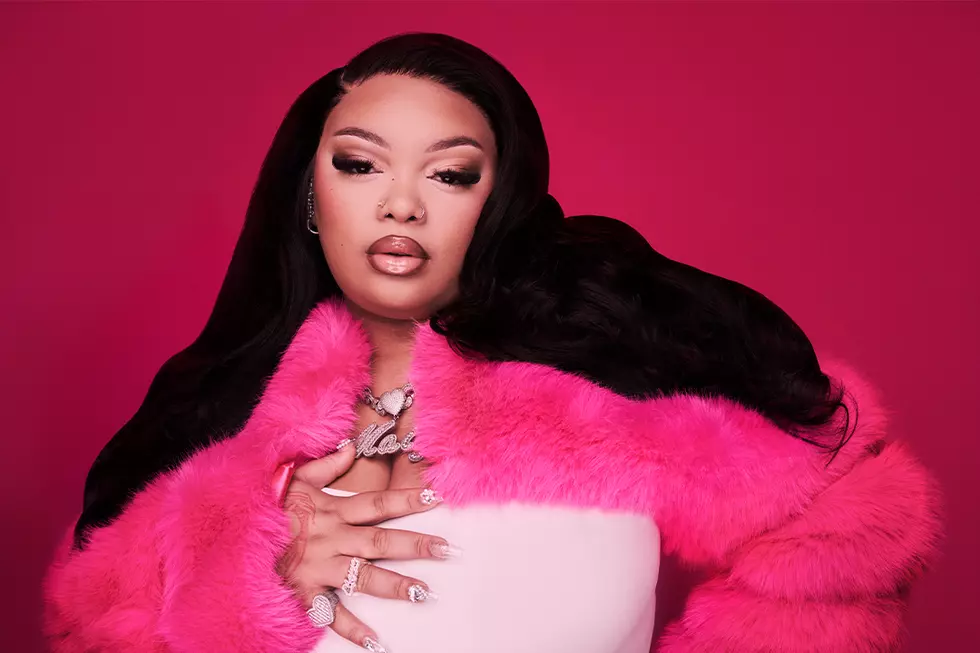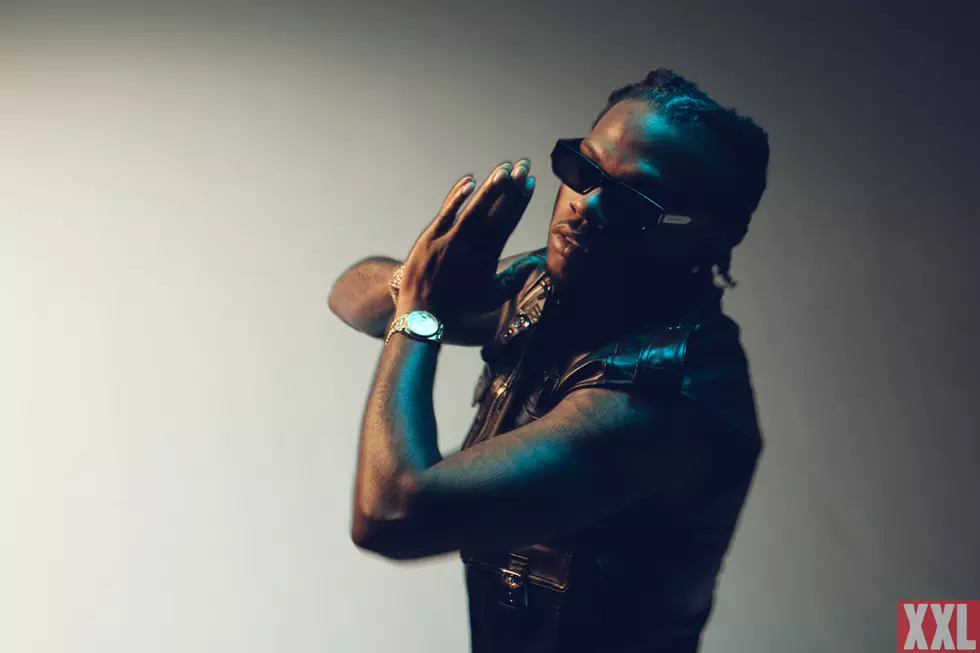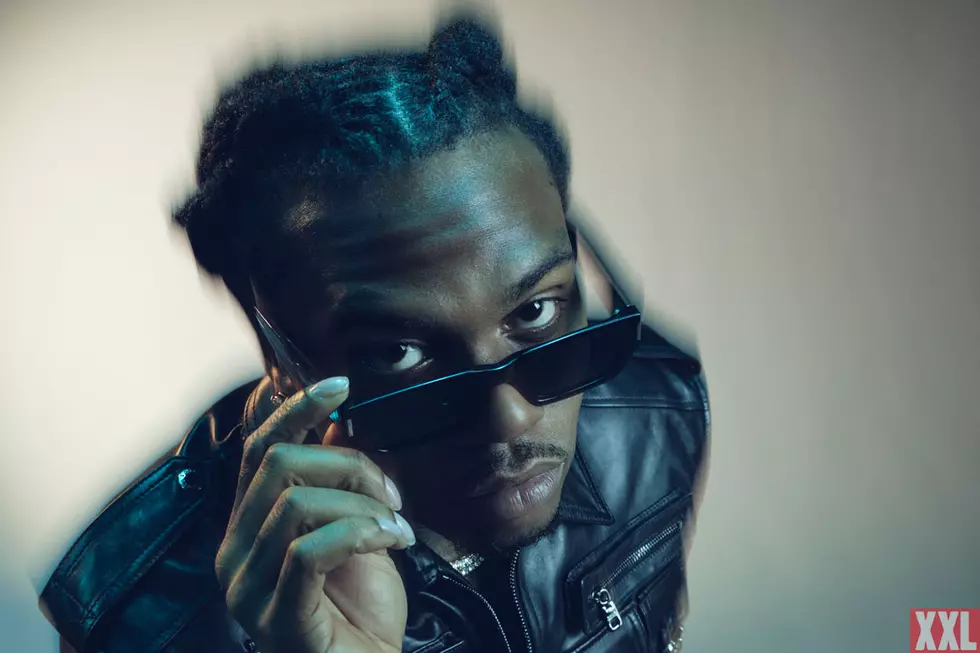
Mozzy’s Life Has Been a Roller Coaster Ride But Success Is Finally Here
A Gangsta's Fairy Tale
It's been a roller coaster ride for Mozzy but success is finally here.
Words: Eric Ducker
Editor’s Note: This story originally appeared in the Fall 2018 issue of XXL Magazine, on stands now.
The temperature is still above 100 degrees on a Monday night in August when Mozzy makes his way into Six Flags Magic Mountain. He walks in the opposite direction of the sun-dazed Southern California crowd that’s now streaming towards the parking lot. If fans recognized him two seconds too late, they holler out his name and he turns around, flashes a peace sign and then keeps it moving. If they spot who’s coming at them, Mozzy obligingly stops to dap them up and pose for a cellphone flick. “You know you’re an OG when a nigga your age calls you an OG,” he tells his manager David “Dave-O” Grear after one encounter.
But when the Sacramento-born rapper is ready to drop $360 for his three platinum Flash Passes, so he could cut to the front of the line on the rides, the clueless dude behind the counter spends almost 10 minutes trying his hardest to not accept the money.
“You do know that the park closes in less than two hours?” No problem.
“We’re going to need a $100 deposit.” No problem.
And once again, this time with his supervisor beside him, “You do know that the park closes in less than two hours?” Yeah, no problem.
“Hey, man, how much longer is this going to take?” asks Dave-O.
Finally, the purchase is made and Mozzy is off in search of the nearest roller coaster. As he’d joked at a gas station earlier today, when he peeled off a fresh $100 bill from his thick roll to pay for a pile of beef jerky and chips, “Don’t they know that I’m a millionaire?”
While Mozzy waits to board the next car for the New Revolution, a classic coaster said to feature the world’s first full vertical loop, a group of teenage girls ask for pictures and a Snapchat video. “You know we named our dog after you?” one tells him.
“Oh, really,” he replies with a smile. “What kind?”
Mozzy, 31, was notorious when he was still living in Sacramento’s Oak Park, the neighborhood he grew up in, but he became a different type of famous (the people-name-their-dog-after-you-type of famous) after he moved to Los Angeles in 2016. For the next two years, the man born Timothy Patterson flooded the zone with solo mixtapes and collaborative projects, building national attention with his slippery slang and darkly confessional lyrics. Last year, he put out 1 Up Top Ahk, by far the most cohesive release of his career and his biggest breakthrough in terms of sales. He’s slowed the stream of music, but this fall he returns with his new album, Gangland Landlord.
His profile got an additional boost at the beginning of 2018 when Kendrick Lamar shouted him out during the Grammy Awards, starting his acceptance speech for Best Rap Album with the words, “This is special, man. Like my guy Mozzy say, you know, God up top all the time, real talk.”
Mozzy was performing in Houston that night and had no idea that King Kendrick was going to mention him at the Grammys. He didn’t even know it happened until his phone started blowing up. “I can’t even bust that down and tell you my exact feelings. That shit’s just too deep,” he says. “That’s love. Niggas don’t do that. We as a people, we don’t reach out and look out for others, not on that type of level. Not on that type of platform.”
This past February, Mozzy appeared on the mournful “Seasons” from the TDE-produced Black Panther soundtrack, dropping heartbroken lines like, “I cried when lil’ bruh died/Got high and watched the sunrise/Wiggle on ’em if it’s one time/They done hung all of my people/I love all of my people/I’m in the slums with all of my people.”
Mozzy has collaborated with Jay Rock and ScHoolboy Q, and says that before the Grammys telecast he met Kendrick, who told him how much he felt his song “Can’t Take It (Ima Gangsta)” featuring Bobby Luv. It’s on that track that he lays out the words that have come to define his mission in hip-hop: “Gangsta rap died with ’Pac/Mozzy brought it back.” He knows that’s what listeners crave and what can return the style to its peak is someone who can articulate that extra dimension of vulnerability and regret lurking underneath the usual tales of menace. “The pain, the death, the depth. I just think they’ve been waiting, they’ve been thirsty for this shit,” Mozzy says.
The rapper has the life experience to provide it. In 2014, the rapper was sent to San Quentin State Prison on a gun charge for a pistol that he says wasn’t his. Then Child Protective Services took away his young daughter, Dooters, who was under a year old at the time. “That just fucked me up,” Mozzy admits. “I just felt like I failed her, felt like I took the same route my pops took. Basically, a route of abandonment. I just felt like I let her down. So I went to family court, all the gangsta shit, and when I got out I was gonna get her in my custody, no matter what. And that’s exactly what I did. I had to stop smoking, stop drinking, you know, all type of classes and hella extra shit. But that’s when I really seen the light, though, when I had my daughter and I was sitting in jail like, ‘A nigga gotta really do better.’ You feel me?”
He had already been rapping for almost a decade, originally under the name Lil Tim, but had been more interested in doing diss records and speaking on local beefs. “In Sacramento, he was like [a] menace to society, almost,” says Dave-O. “When you mentioned Lil Tim, he was like the demon spawn. When you think of him, you think of beating people at the Light Rails, getting into shootouts, shootin’ up parties, all kinds of stuff.”
After doing a bid of a year, he got his first $200 for a verse. From then on he decided that music was how he was going to change his situation. He calculated that if he made $1,000 off of every project and if he released 100 projects, that would be $100,000. That amount of money could change your life. And even if he fell short and only made $500 off a project, that might still be enough. So, 100 releases became his target. “I felt like I was trying to get out the streets by any means, even if I had to nickel and dime my way out the streets,” he says. He figures he got up to about 60 projects before 1 Up Top Ahk hit.
But even more importantly, at the start of his push, he recognized what would make him stand out. “I embraced my struggles,” he says. “I started rapping about being broke and I stopped trying to hide it and stopped trying to avoid it, ’cause it was a sensitive subject. When a nigga called me broke, it really stabbed me. It wasn’t like it was just a joke, nah, I took it personal ’cause I was really broke. I was suffering. I was going through it. Once I stopped hiding that shit, once I stopped trying to act like I was balling and just embraced it for what it was, everything took off for me, ’cause I think there’s more unfortunate than fortunate in the world anyway.”
Six months after coming home from prison, he moved to the nearby Bay Area for a bit before heeding Dave-O’s advice and relocating to Los Angeles. While many rappers on the come up move away from their neighborhoods to separate themselves from the people in their lives who might drag them back into some unsavory shit, Mozzy brought his whole crew with him. He says that what he really needed to get away from was the Sacramento police. In L.A., he wasn’t a concern for law enforcement. “[The police] don’t fuck with me down here, I ain’t no big fish down here,” he says. “I’m a rapper, I’m an entertainer ’round here. When I go home, they treat a nigga like he a gang chief or something.”
“Even his probation officer told him there’s a shot for you [in the music industry],” says Dave-O. “His probation officer told him, ‘If you come back to Sacramento I’m going to violate you.’ Instead of, at first, ‘If you leave Sacramento I’m going to violate you.’ It’s like, If we catch you in Oak Park hangin’ around, you’re going to jail.”
Mozzy is a Blood (red Jordans, red cellphone case, red cherry-flavored Icee in his cup), but in Los Angeles he saw that the Crips were also embracing him. “Once I landed here and tapped in with the slums and the people, them boys in them trenches, they showed nothing but purified love,” he says. “When you got love coming from the blue raggers, it’s crazy. It’s a whole different feeling.”
During Mozzy's journey to stardom, the rapper found himself with a new struggle, a battle with drugs, particularly lean. With two daughters in his custody, he knew he had to do right by them. At the start of 2018, he put up a video on Instagram that showed him pouring out a purple pint at a gas station almost two weeks after quitting. It remains one of his most popular posts. “I wasn’t able to work,” he tells of his addiction. “I was always lethargic, slow. I could just feel my body aging.” He describes his detox—spending days half-naked, curled up on his bathroom floor and vomiting—as one of the worst physical struggles he’s ever endured. “I ain’t gon’ lie, I was embarrassed,” says Mozzy. “I did a lot of interviews off of it and I was very embarrassed. You could just tell I was drug [abusing]. You know that ain’t no good look.”
With a renewed focus, he was able to concentrate on Gangland Landlord. For the first time, instead of just plowing on to new material, he would go back and revise what he recorded— taking the time to improve the hooks or slide his verses over to a reworked beat. While the production of fellow Sacramento native June mostly defined the sound of 1 Up Top Ahk, on Gangland Landlord the palate is broadened with contributions from beatmakers like Tampa, Fla.’s DJ Swift and L.A.’s Sorry JayNari, as well as some from Dave-O. It’s a cautiously celebratory album, as Mozzy’s success is still haunted by the pain he went through and that he knows that others endure. As he raps in the album’s eerie “Outro,” “They’d rather break us than build us up in this broken system.” Even when Luniz’s feel-good weed anthem “I Got 5 On It” gets sampled for “Not Impressive,” it’s a dark recontextualization of singer Mike Marshall’s words, “It’s got me stuck and I’m tore back.”
Mozzy says the album’s title is a reference to his 2015 mixtape, Gangland Landscape. It’s meant to show the progress he’s made since that time. “We went from crash dummy to goon status, goon status to fella fella, from fella fella to the landlord,” he says. “Be the head honcho of something.”
By the time Mozzy steps off CraZanity, his last ride of the night at Magic Mountain, it’s 90 minutes past the park’s closing time. While he waits near the exit as Dave-O retrieves the deposit for the Flash Passes, he spends more than 15 minutes patiently and politely snapping photos with every single person who comes up to him. Some are genuine fans, geeked to be near the man who made “Sleep Walkin.” Some just see other people doing it and figure they might as well stand next to whoever this exuberant guy is with the dreads.
One little girl, who looks to be about 8 years old, keeps coming back to hit him with questions. When did he start making music? Does he know Nicki Minaj? He dutifully answers each one.
What’s being a rapper like?” she asks. “It’s a lot of fun,” Mozzy replies. “You get to do this.”
Check out more from XXL’s Fall 2018 issue including Meek Mill's letter to his younger self, Show & Prove interviews with Gunna and City Girls, Lil Durk opening up about his Signed to the Streets 3 album , boxer Errol Spence Jr.'s connection to Dallas hip-hop, the A-list features on Swizz Beatz's forthcoming Poison album, a report on hip-hop's relationship with mental health, a look at the comparison between the late rappers XXXTentacion and Tupac Shakur and more.
See Photos From Meek Mill's Fall 2018 Cover Shoot
More From XXL









